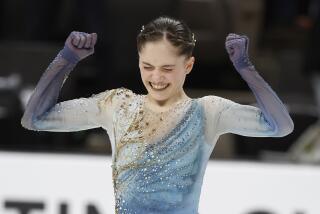Asada fizzles out and finishes third
- Share via
HARTFORD, CONN. — Pop went the triple axel. Pop went the spark from Mao Asada. Pop went the air of inevitability that the Japanese teenager is the sport’s rising star between now and the 2010 Olympics.
It took only 25 seconds Saturday for Asada to come down to earth without the aura she had hung in the Hartford Civic Center a day earlier.
One mistake led to another, and before Asada knew it she was in the middle of an utterly unremarkable four minutes on the ice, a long program that seemed even more ordinary by comparison to her stunning short program a day earlier.
She dropped from first to third in the final standings at Skate America, beaten by compatriot Miki Ando and Kimmie Meissner of the United States. It was Ando’s first victory in an international competition since 2004.
“I feel regrettable about today’s result,” Asada said.
The 16-year-old also insisted the botched triple axel did not affect the rest of the program, but that belied appearances.
“She didn’t give up, but she didn’t show up like yesterday,” said Rafael Arutunian, Asada’s coach. “After the triple axel, she was a little bit upset.
“She is still a child in experience. When she gets experience, this will not happen.”
Asada went up for the 3 1/2 -revolution jump, but aborted it -- a “pop” in skating parlance -- after one revolution. Her next planned triple became a double and, by the time Asada landed her first triple after 2 minutes 30 seconds, she appeared to have lost interest.
It was an unexpected meltdown, especially given the ease with which Asada tossed off triple axels in her Saturday practice and at the end of the warmup before her long program.
“I didn’t feel any pressure,” she said.
Meissner, 17, admitted to some nervousness before this first event in the Grand Prix series and her first as reigning world champion. That anxiety owed mainly to falling behind in her training while capitalizing on some of the opportunities -- parades, first pitches, ESPYs -- that came with the world title.
A flawed short program left Meissner 10 points behind Asada and eight behind Ando. She recovered nicely in the long program, when her only mistakes involved reducing a triple-triple combination to a triple-double.
Meissner still fell 15 points short of Ando, whose skating the last two days was a marked contrast to her dismaying 15th-place effort at the 2006 Olympics.
Ando, 18, switched coaches after last season, moving from Carol Heiss to Nikolai Morozov, the Connecticut-based Russian who resurrected Shizuka Arakawa’s career in only three months before Arakawa became the 2006 Olympic champion. Ando has been with Morozov barely two months.
The My Fair Lady trick? “It’s a secret,” Morozov said.
Ando, the only woman to have done a quadruple jump in competition, could barely do any jumps consistently during an injury-racked 2006 season.
“I wanted to perform in the Olympics what I did tonight,” she said.
Ando did seven triple jumps easily, but she was as emotionless after that performance as she had been during it.
“Last year, I had a lot of mistakes,” Ando said. “This year, I wanted to be the Miki without mistakes.”
Rena Inoue and John Baldwin each fell once in Saturday’s long program, but those mistakes were not enough to keep them from beating a painfully weak field and become the first U.S. pair since 1991 to win at Skate America.
*
Hersh covers the Olympics for The Times and the Chicago Tribune.
More to Read
Go beyond the scoreboard
Get the latest on L.A.'s teams in the daily Sports Report newsletter.
You may occasionally receive promotional content from the Los Angeles Times.






